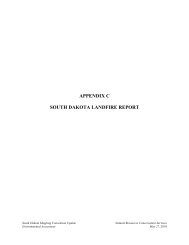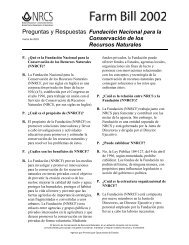The Ozette Prairies of Olympic National Park - Natural Resources ...
The Ozette Prairies of Olympic National Park - Natural Resources ...
The Ozette Prairies of Olympic National Park - Natural Resources ...
Create successful ePaper yourself
Turn your PDF publications into a flip-book with our unique Google optimized e-Paper software.
urned one way and others a different way. Knowledge <strong>of</strong> the specifics <strong>of</strong> burning is not lacking entirely,<br />
however. <strong>The</strong>re are good bases for making some general conclusions and well-founded speculations.<br />
During what season did the <strong>Ozette</strong> people burn the wetlands? <strong>The</strong> possibilities narrow down to<br />
summer and fall, because these seasons <strong>of</strong>fer times when drier and warmer weather leaves the vegetation<br />
dry enough to burn. Although some sources (Emil Person, for example) mention summertime burning<br />
(June and July), the bulk <strong>of</strong> the evidence points to fall as the season for bringing fire to the wetlands.<br />
According to fire ecologist James Agee (pers. comm. 2009):<br />
July and August are the highest months for lightning ignitions. This is not suggestive<br />
that native burning necessarily followed the same pattern. <strong>The</strong> lightning ignitions<br />
are forest-related and focus on moisture content <strong>of</strong> fine dead fuels, while the prairie<br />
fires would have depended on partially cured herbaceous fuels, which likely occurred<br />
later than July and August, and the cultural advantage <strong>of</strong> burning after berry harvest.<br />
Clearly, east winds, which occur at higher frequency in summer and fall, and carry<br />
lower humidity (and sometimes higher velocity) would have been favored times to<br />
burn, and even after September rains an east wind can dry fine fuels in a day or less.<br />
<strong>The</strong>y normally occurred over 3-day periods, which gave natives the opportunity for<br />
short-term planning.<br />
<strong>The</strong> Makah name for the fall season is qw!aya’tex, a word that means “hard” or “tough,” but<br />
which can be translated to mean “dried-up time” when used in a seasonal context (Waterman 1920:46<br />
vol I.). This conception <strong>of</strong> the autumn suggests that the Makah thought <strong>of</strong> it as the time when the vegetation<br />
was at its driest and thus best able to carry a fire. Bud Klock stated that he believed September and<br />
October were the months that the Indians burned the wetlands, and according to several sources this was<br />
also the time <strong>of</strong> year that Pete Roose did his burning <strong>of</strong> the wetland (James Wesseler and Bud Klock pers.<br />
comm. 2003). It is reasonable to assume that Roose was following what he knew the Indians had done.<br />
In the historical literature, Albert Reagan (1908:148–149) mentions that the <strong>Olympic</strong> tribes burned<br />
the bracken fern in the fall to enhance its growth in the spring. In reference to Ts’oo-yuhs Prairie, two<br />
Makah informants mentioned the fall (September and October) as the time when the wetland was set<br />
fire, and another informant, John H. Ides, says the burning occurred when the cranberries were picked—<br />
which corresponds to early fall as well.<br />
Sources vary considerably as to the frequency <strong>of</strong> burning on the <strong>Ozette</strong> <strong>Prairies</strong>. Four sources<br />
(two newspaper accounts, and the testimony <strong>of</strong> Emil Person, and Bob Bowlby) say that burning in the<br />
<strong>Ozette</strong> <strong>Prairies</strong> took place every year. Bud Klock stated every one to three years. With regard to Ts’ooyuhs<br />
Prairie, Kate McCarty said that burning did not take place every year. Greg Colfax said that burning<br />
53
















